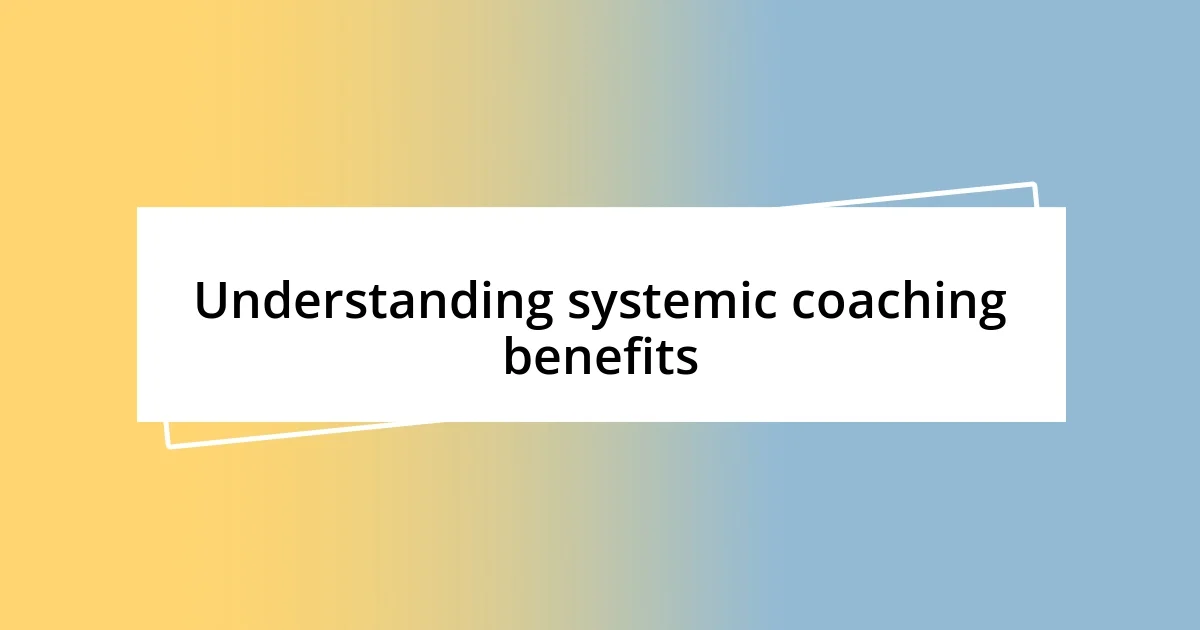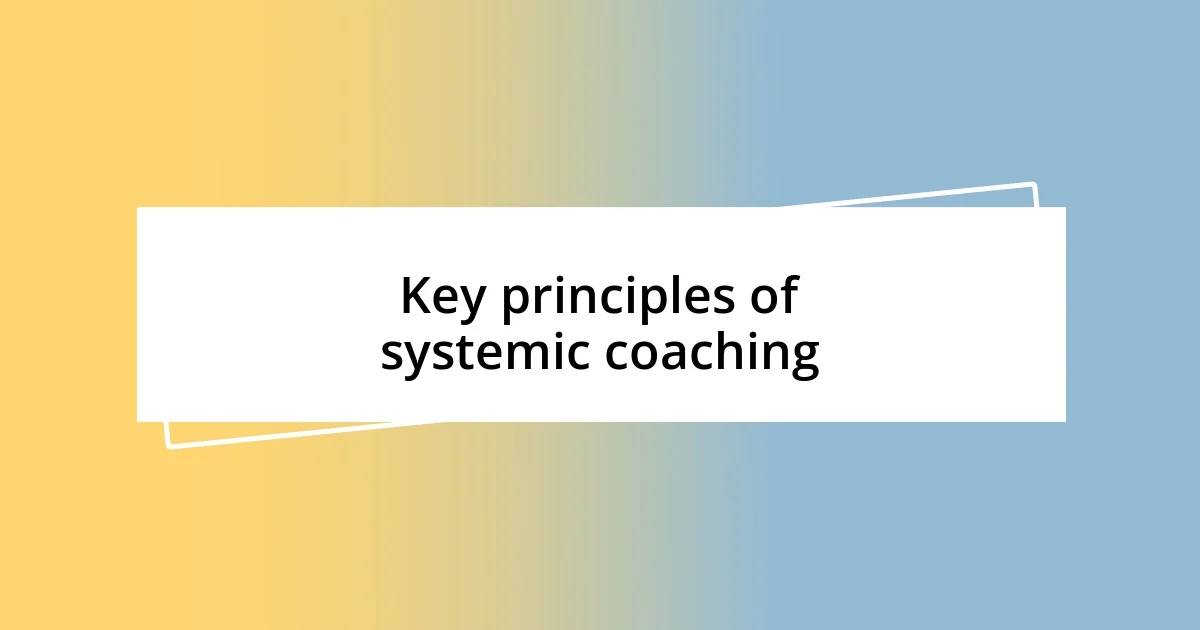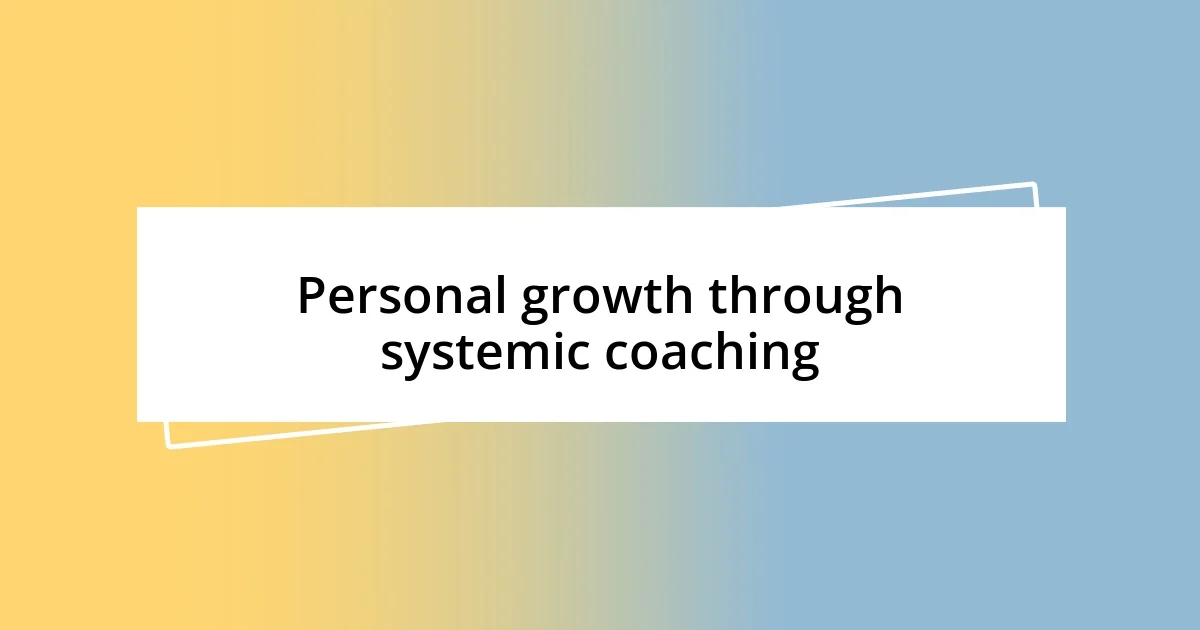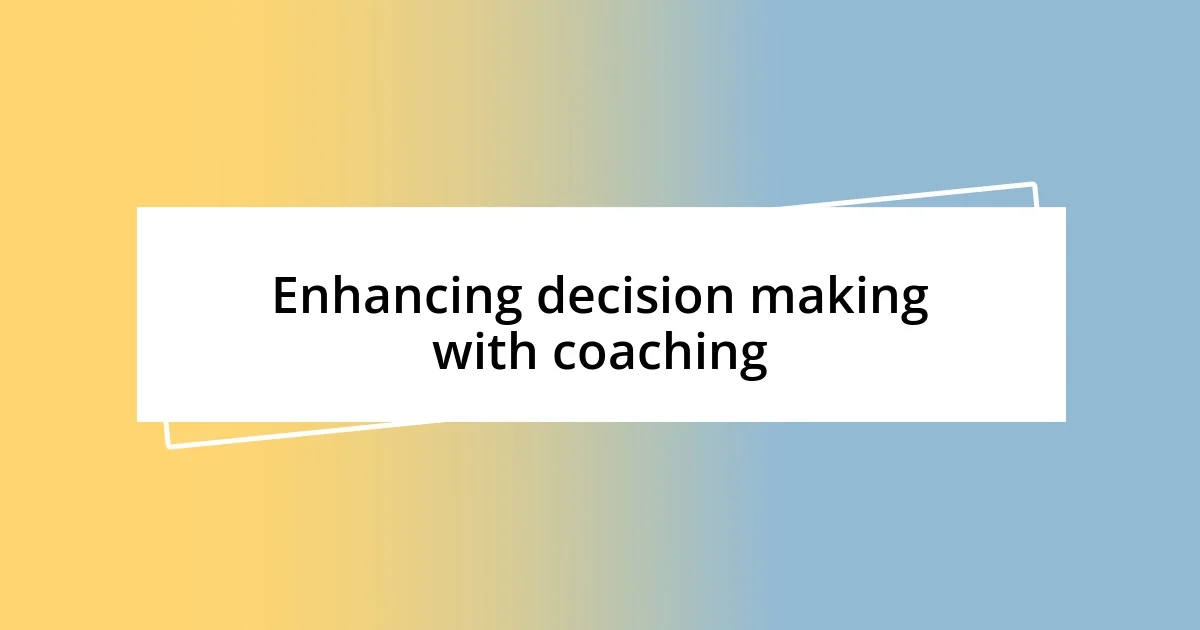Key takeaways:
- Systemic coaching enhances awareness of behavioral patterns, leading to sustainable change and increased clarity in decision-making.
- Key principles of systemic coaching focus on the interconnectedness of individuals, fostering effective collaboration and supporting holistic personal growth.
- Real-life examples illustrate transformation through coaching, helping individuals overcome self-doubt, redefine career paths, and improve public speaking skills through accountability.

Understanding systemic coaching benefits
Systemic coaching offers a holistic approach that goes beyond individual challenges. I remember a time when I was navigating a complex team dynamic. The insights I gained through systemic coaching helped me see how interconnected our roles were, allowing me to address issues far beyond my immediate concerns.
One of the most profound benefits I’ve experienced in systemic coaching is the increased awareness of patterns in my behavior and those around me. Have you ever felt stuck in a cycle, wondering why some problems keep resurfacing? By exploring the systems at play, I learned to identify these recurrent themes, which not only freed me from frustration but also empowered me to enact sustainable change.
Another significant advantage of systemic coaching is the clarity it brings to decision-making. I once faced a pivotal career choice that felt overwhelming. Through the process, I discovered how my values and relationships influenced my options. This clarity not only reduced my anxiety but also gave me the confidence to choose a path that aligned with my deeper goals.

Key principles of systemic coaching
Key principles of systemic coaching emphasize the interconnectedness of individuals within their environments. Every person’s challenges are often reflections of broader patterns. I can vividly recall a coaching session where I grappled with feeling undervalued in my role. It became clear that my perception was shaped by the organizational culture, not just my individual experience. By recognizing this connection, my perspective shifted, leading to a more empowered stance in my interactions.
Here are some fundamental principles that define systemic coaching:
- Holistic Perspective: It considers the entire system, looking at how various elements interact and influence each other.
- Interconnectedness: Recognizing that individual issues often stem from larger systemic or relational dynamics.
- Pattern Recognition: Identifying recurring behaviors and themes that reveal underlying beliefs and assumptions.
- Collaboration: Fostering an environment of support and shared insights for deeper understanding.
- Change Focused: Encouraging actionable steps that align with the individual’s values and larger goals.
These principles helped me cultivate not just a better understanding of my situation but also a deeper sense of empowerment to navigate my path. It’s fascinating how seeing the bigger picture can illuminate the smaller, yet impactful, nuances of our daily lives.

Personal growth through systemic coaching
Systemic coaching has been a catalyst for my personal growth, helping me to cultivate a deeper understanding of my motivations and values. I distinctly recall a moment during a session when I was encouraged to reflect on my past experiences. The emotions that surfaced were profound; it was as if I was peeling back layers of my own identity. By linking these feelings to my current challenges, I gained invaluable insights that propelled me forward, enriching my perspective.
Moreover, systemic coaching enhanced my ability to communicate with others. I remember struggling with misunderstandings in my relationships. Through coaching, I realized how my communication style unintentionally contributed to these conflicts. This new awareness allowed me to approach conversations with empathy and clarity. The result? Not only did my relationships improve significantly, but I also felt more confident expressing myself genuinely.
The beauty of systemic coaching lies in its ability to foster resilience. I faced a tough setback that initially felt like a wall. However, through our sessions, I learned to view this experience as part of my journey rather than a stopping point. This shift in perspective instilled a sense of hope and determination. In retrospect, the setbacks became stepping stones that ultimately guided me toward growth.
| Aspect | Experience |
|---|---|
| Emotional Awareness | Peeling back layers of identity during reflection sessions |
| Communication Skills | Improved relationships through empathetic conversations |
| Resilience | Setbacks viewed as opportunities for growth |

Enhancing decision making with coaching
Engaging in systemic coaching significantly altered how I approach decision-making. There was a time when I felt overwhelmed by choices at work, often hesitating due to fear of making the wrong call. During a coaching session, we explored my thought process in-depth. I discovered that my hesitation stemmed from a need for external validation. Recognizing this pattern empowered me to prioritize my values over others’ opinions, leading to more confident decision-making.
One technique that truly resonated with me was the “decisional clarity framework.” I applied it during a particularly challenging project. By breaking down the decision into smaller, manageable parts, I could visually assess the pros and cons without getting lost in overwhelming emotions. This method not only alleviated stress but also helped me align my choices with my long-term goals. Have you ever felt paralyzed by choices? I can relate. Systemic coaching taught me that clarity often comes from simplifying complexity.
Moreover, I learned to embrace collaboration as a part of my decision-making process. Initially, I viewed asking for input as a weakness. However, I now see it as a strength. One memorable session focused on group dynamics highlighted how collective insights could illuminate blind spots in my thinking. I remember a decision I made with team feedback, which ultimately led to a more innovative solution. This shift helped me appreciate diverse perspectives and reinforced my belief that the best decisions often come from collaboration.

Applying insights from coaching sessions
Applying insights from coaching sessions has created a tangible shift in my life. For instance, one session encouraged me to visualize my goals, and I vividly remember sketching them out. This simple act transformed my aspirations into actionable steps. It’s astonishing how clarity can emerge through visualization, allowing me to see the path forward more clearly.
I still recall the moment I learned about the concept of “mindful reflection” during my coaching sessions. I began setting aside time each week to actively engage with my thoughts and feelings. By doing this, I observed patterns in my behavior that I hadn’t considered before. Have you ever taken a step back to reflect on your experiences? For me, it was a game-changer, equipping me with a more profound awareness that influences my choices daily.
Moreover, embracing feedback became a crucial point of application after one enlightening discussion with my coach. I shared my fear of criticism, feeling it would undermine my confidence. To my surprise, my coach revealed that feedback is often a gift in disguise. This perspective shifted how I viewed others’ input, prompting me to actively seek it out. Now, I find myself not only welcoming feedback but also viewing it as an invaluable tool for personal growth and development, enriching my relationships and decision-making alike.

Real-life examples of coaching success
One of the most profound transformations I witnessed through coaching was when a colleague of mine, who was struggling with imposter syndrome, stepped into her confidence. During her coaching journey, she confronted the voice of self-doubt that had held her back from pursuing leadership roles. By utilizing a strategy of reframing negative thoughts, she articulated her strengths in a way that resonated deeply within her. I remember her sharing that the first time she spoke up during a meeting, her heart raced—yet the applause that followed was a clear indication of her impact. Isn’t it powerful how addressing internal barriers can unlock potential that we never knew existed?
Another striking example comes from a friend who utilized coaching to redefine his career path. He found himself stuck in a job that no longer fulfilled him. During a pivotal coaching session, they dissected his passion areas, and he realized how much he missed creative work. That epiphany led him to pursue freelance opportunities in graphic design. He now shares how that leap into the unknown became one of the most rewarding decisions of his life. Have you ever felt confined by your current situation? Sometimes, a single conversation can spark a chain reaction of change that leads to unexpected joy.
In my own experience, I saw the value of accountability in coaching when I set a goal to improve my public speaking skills. The first few attempts were nerve-wracking, but the anticipation of sharing progress with my coach kept me motivated. I vividly remember preparing for a local talk, where I was able to practice in a supportive space before presenting. That session felt like an emotional safety net, allowing me to embrace vulnerability and really connect with my audience. Isn’t it amazing how having someone to hold us accountable can turn anxiety into excitement? I now approach speaking engagements as opportunities for growth rather than sources of fear.












